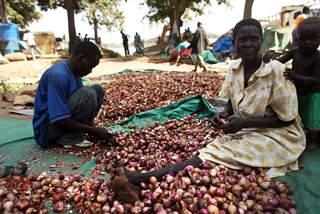Hunger looms in S. Sudan region as officials seek assistance
July 28, 2015 (JUBA) – Authorities in South Sudan’s Eastern Equatoria state have asked the central government and aid agencies to help combat looming famine in the region.

“We want to make it known to the international communities and people of South Sudan that Eastern Equatoria state has been affected seriously by the long drought,” Akio said.
“Hunger is being experienced across the state in almost all counties because the first crops that should have helped people dried because of long drought and seriously affecting people,” he added.
The Eastern Equatoria region falls within the greenbelt, a term used in reference to areas blessed with arable land suitable for farming and other forms of agricultural activities.
According to state officials, the last rains were experienced in April, as prolonged dry season later ensued leading to drying up of crops.
“The government is appealing for some intervention because when people are hungry, animals like cattle get depleted,” stressed Akio.
South Sudan heavily relies on neighboring countries to import food items to its markets, despite huge agricultural potentials. The situation has, however, been aggravated by the 19-months old conflict that has made some parts of the country inaccessible.
At the moment, however, scarcity of foreign currencies needed by traders to purchase merchants from abroad means that the few items on the markets are very expensive.
Only about 4% of South Sudan’s arable land is reportedly utilised for agriculture, yet over 7%of the country’s population are actively engaged in the sector to improve livelihoods.
In 2013, however, the young nation’s agriculture and forestry ministry announced plans for a comprehensive master plan, seeking to vividly revive the largely dormant sector, as part of plans to diversify the country’s economy, which largely depends on oil revenues.
(ST)
